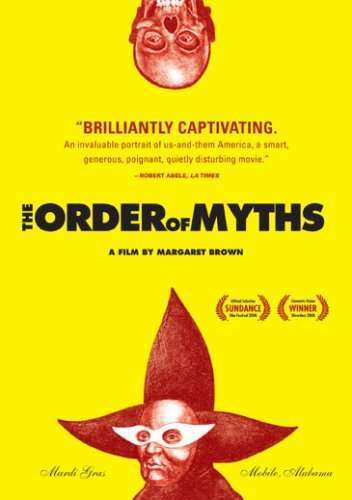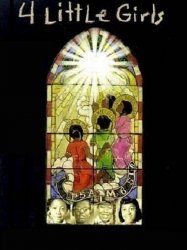The Order of Myths is a american film of genre Documentary released in USA on 5 july 2008
The Order of Myths (2008)

If you like this film, let us know!
- Infos
- Casting
- Technical infos
- Photos
- Videos
- Film quotes
- Characters
- Music
- Awards
Released in USA 5 july 2008
Length 1h19
OriginUSA
Genres Documentary
Themes Films about racism, Documentary films about racism, Documentary films about law, Documentary films about historical events, Documentaire sur une personnalité, Documentary films about politics, Political films
Rating68%










The Order of Myths is a 2008 documentary film directed by Margaret Brown. It focuses on the Mardi Gras celebrations in Mobile, Alabama, the oldest in the United States. It reveals the separate mystic societies established and maintained by black and white groups, and acknowledges the complex racial history of a city with a slaveholding past. While showing the mystic societies' ties to economic, class and racial stratification, the film also showed the beginnings of interaction between the black and white courts. It also tells some of the history of Africatown, a community formed north of Mobile in 1860 by Africans from Ghana, transported illegally as slaves to Mobile decades after the end of the slave trade.
The film competed in the Documentary Competition at the 2008 Sundance Film Festival. It had a limited release in New York on July 25, 2008, and ran on Independent Lens, a PBS series featuring independent films, in 2009. It was distributed by The Cinema Guild.
Comments
Leave comment :
Suggestions of similar film to The Order of Myths
There are 8985 with the same cinematographic genres, 10576 films with the same themes (including 50 films with the same 7 themes than The Order of Myths), to have finally 70 suggestions of similar films.If you liked The Order of Myths, you will probably like those similar films :

Malcolm X (1972)
, 1h31Directed by Arnold Perl
Origin USA
Genres Drama, Documentary
Themes Films about racism, Documentary films about racism, Documentary films about law, Documentary films about historical events, Documentaire sur une personnalité, Documentary films about politics, Political films
Actors James Earl Jones, Ossie Davis
Rating74%






Directed by Gail Dolgin
Genres Documentary, Historical
Themes Films about racism, Documentary films about racism, Documentary films about law, Documentary films about war, Documentary films about historical events, Documentaire sur une personnalité, Documentary films about politics, Documentary films about health care, Political films
Rating6%






Freedom on My Mind (1994)
, 1h45Origin USA
Genres Documentary
Themes Films about racism, Documentary films about racism, Documentary films about law, Documentary films about historical events, Documentaire sur une personnalité, Documentary films about politics, Political films
Rating79%





In 1961, Mississippi was a virtual South African enclave within the United States. Everything was segregated. There were virtually no black voters. Bob Moses entered the state and the Mississippi Voter Registration Project began. The first black farmer who attempted to register was fatally shot by a Mississippi State Representative. But four years later, the registration was open. By 1990, Mississippi had more elected black officials than any other state in the country. As the New York Times said in their review of the film, "a handful of young people, black and white, believed they could change history. And did."

Mississippi Cold Case (2007)
, 42minutesOrigin Canada
Genres Documentary
Themes Films about racism, Documentary films about racism, Documentary films about law, Documentary films about historical events, Documentaire sur une personnalité, Documentary films about politics, Political films
Rating55%






A Time for Justice (1994)
, 38minutesDirected by Charles Guggenheim
Origin USA
Genres Documentary
Themes Films about racism, Documentary films about racism, Documentary films about law, Documentary films about historical events, Documentaire sur une personnalité, Documentary films about politics, Political films
Rating67%





Une histoire des mouvements pour les droits civiques aux États-Unis, allant de l'assassinat d'Emmett Till en 1955 jusqu'à la loi Voting Rights Act de 1965.

4 Little Girls (1997)
, 1h42Directed by Spike Lee
Origin USA
Genres Documentary, Historical
Themes Films about racism, Films about terrorism, Documentary films about racism, Documentary films about law, Documentary films about war, Documentary films about historical events, Documentaire sur une personnalité, Documentary films about politics, Documentary films about terrorism, Political films
Actors Ossie Davis, Spike Lee, Bill Cosby, Walter Cronkite
Rating77%





Film documentaire, 4 little girls revient sur l'attentat à la bombe dans une église afro-américaine qui, en 1963, tua quatre fillettes âgées de 11 à 14 ans.

Home of the Brave (2004)
, 1h15Origin USA
Genres Documentary
Themes Films about racism, Documentary films about racism, Documentary films about law, Documentary films about historical events, Documentaire sur une personnalité, Documentary films about politics, Political films
Actors Stockard Channing, Gloria Steinem
Rating71%






Origin USA
Genres Documentary, Historical
Themes Films about racism, Documentary films about racism, Documentary films about law, Documentary films about historical events, Documentaire sur une personnalité, Documentary films about politics, Political films
Rating74%






Motherland (2010)
, 1h58Directed by Owen 'Alik Shahadah
Origin USA
Genres Documentary
Themes Films set in Africa, Films about slavery, Films about racism, Documentary films about racism, Documentary films about law, Documentary films about historical events, Documentaire sur une personnalité, Documentary films about politics, Political films
Actors Harry Belafonte, Abdulkadir Ahmed Said
Rating82%





Motherland is an epic documentary about the African continent from Ancient Egypt to the present. It is an overview of African history and contemporary issues but with the African people at the centre of the story. It is one of the first Pan-African features to be made.
 , 32minutes
, 32minutesOrigin USA
Genres Documentary
Themes Films about racism, Documentary films about racism, Documentary films about law, Documentary films about historical events, Documentaire sur une personnalité, Documentary films about politics, Political films
Rating73%





 Connection
Connection